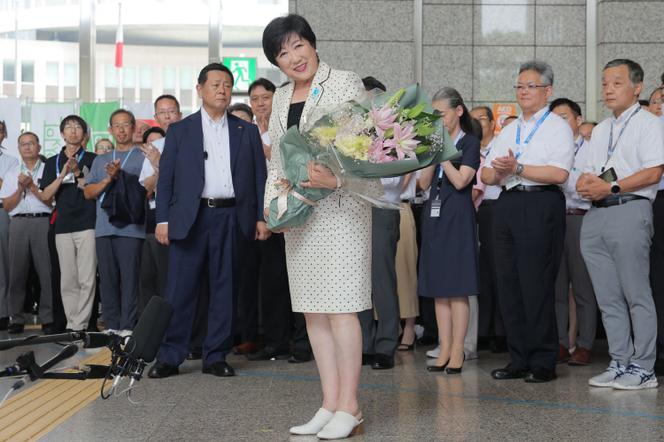


The tanuki ("raccoon") is a beloved animal in Japan, where folklore has made it a master of metamorphosis. Many Japanese find the same talents in Yuriko Koike, a fervent nationalist who dreams of becoming prime minister, after being widely re-elected on Sunday July 7, with 42.8 % of the votes cast, for a third term as Tokyo governor.
Dubbed "The Green Raccoon" - the color of her Citizens First Party - the 71-year-old ultranationalist beat out more than 50 opponents with the backing of the ruling conservative Liberal Democratic Party (LDP). Her program, entitled "Tokyo major reforms, 3.0," was based on three pillars: "security, diversity, smart city." As part of her campaign, Koike promised strong measures for the environment and families with children, in line with her efforts to promote free schooling, all of which should appeal to Tokyoites worried about the cost of living and demographic decline.
The governor, who enjoys a truly international stature, is particularly appreciated for her efforts in favor of families and disaster preparedness in a city at high risk of earthquakes. "I received the unconditional support of the people of Tokyo, who once again asked me to promote more reforms and improve their living conditions," Koike declared, thus perfecting her foothold in the capital of 13.5 million inhabitants.
Rarely seen in Japan until this point, the campaign has generated real interest. Turnout reached 60.6%, compared with 55% in 2020. It was also punctuated by incidents such as booing and threats during the speeches of the main candidates, including Koike and wild poster operations. "I've never seen anything like it," lamented the governor, but that didn't stop her from largely dominating her opponents. The first of these, Renho Murata, a candidate supported by the entire opposition, was banking on a progressive program to topple the outgoing governor.
Yuriko Koike was born in 1952 in Ashiya, Hyōgo Prefecture (West). She studied sociology at Kwansei Gakuin University before entering Cairo University, a choice dictated by her father, an oil trader and promoter with strong ties to Arab countries. While in Egypt, she met a Japanese student whom she married before divorcing a few months later. She never remarried.
Even if there are doubts about the reality of her Cairo diploma, Koike has worked as an interpreter, then as a presenter, on the private channel TV Tokyo. She entered politics and was elected to the upper house for the first time in 1992, with the support of the now-defunct New Japan Party.
You have 53.47% of this article left to read. The rest is for subscribers only.
